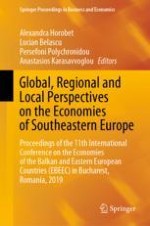2021 | OriginalPaper | Chapter
Supranational Class Formation and Concept of Control in Global Economy
Authors : Efstratios Kypriotelis, Eirini Triarchi, Konstantinos Karamanis
Published in: Global, Regional and Local Perspectives on the Economies of Southeastern Europe
Publisher: Springer International Publishing
Activate our intelligent search to find suitable subject content or patents.
Select sections of text to find matching patents with Artificial Intelligence. powered by
Select sections of text to find additional relevant content using AI-assisted search. powered by
